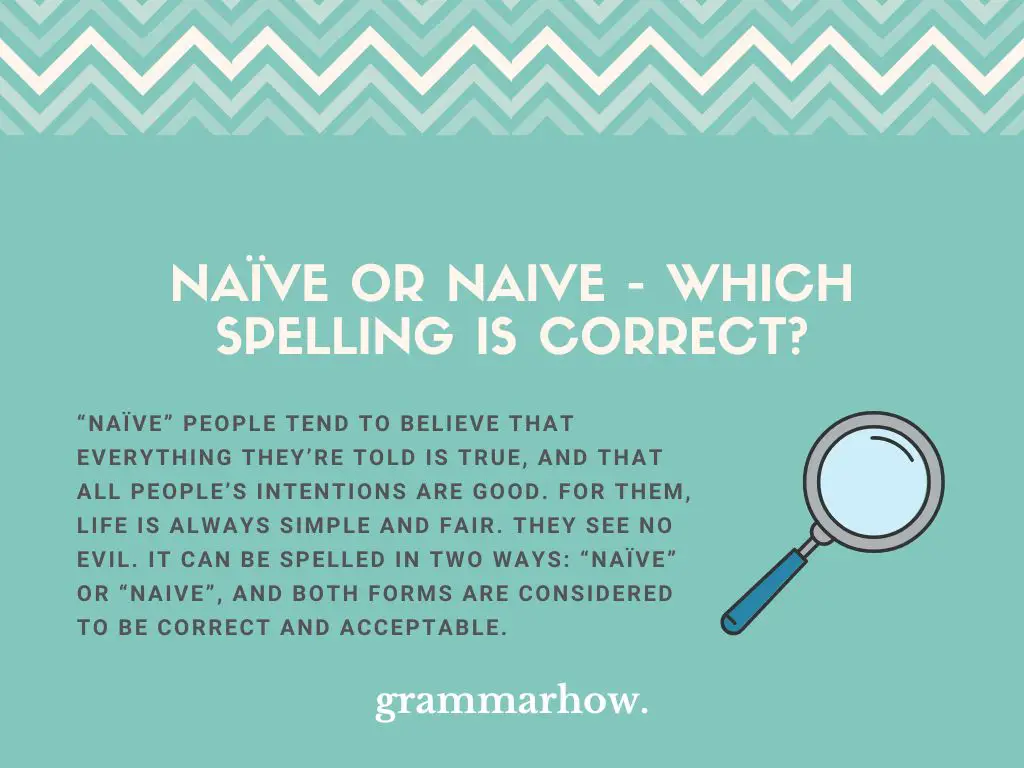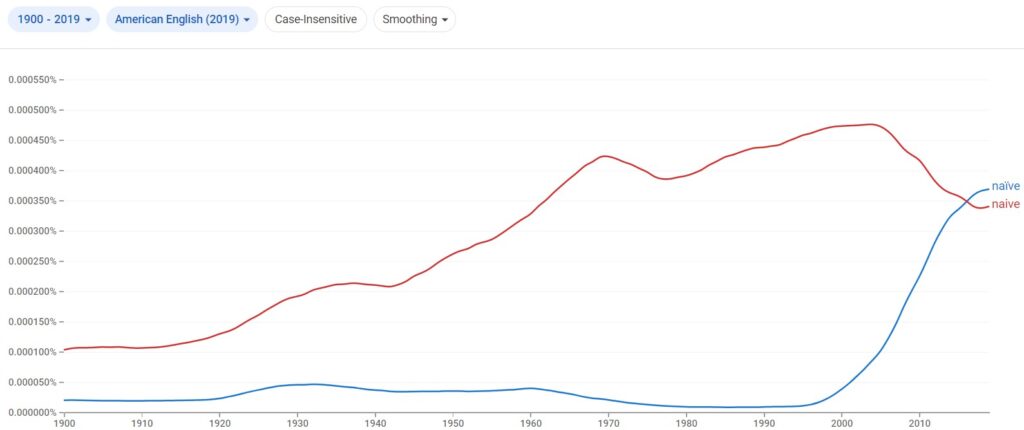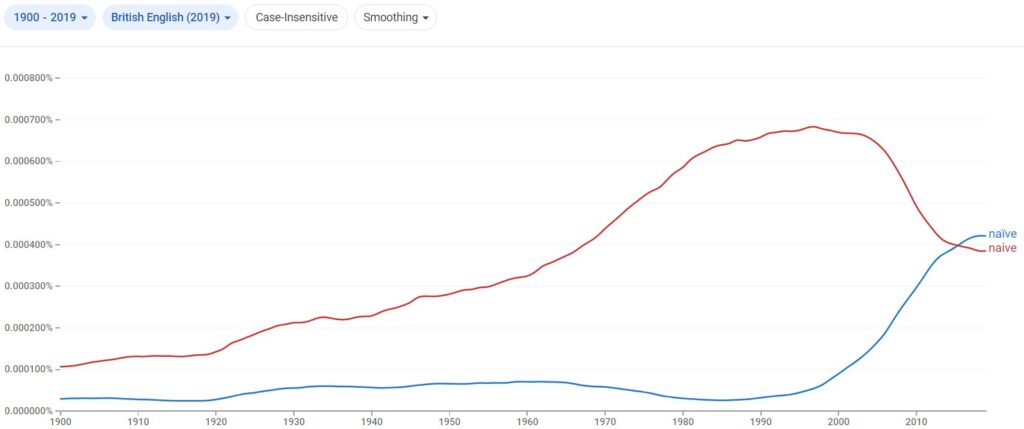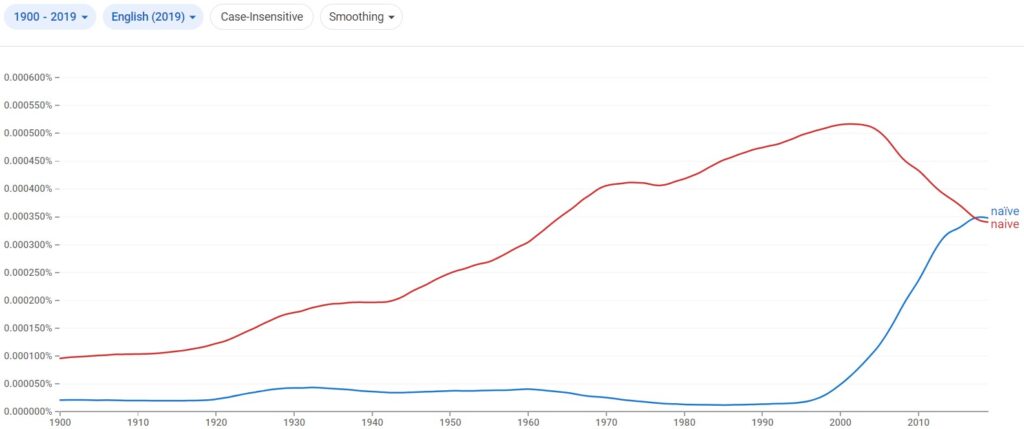What’s the correct spelling: “Naïve” or “Naive”? I’m sure you’ve seen both forms in use. Have you ever questioned which one is correct?
We want to know if both can be used in our sentences. And if not, which of the forms is correct? And which should be avoided?
Naïve or Naive – Which Spelling Is Correct?
“Naïve” people tend to believe that everything they’re told is true, and that all people’s intentions are good. For them, life is always simple and fair. They see no evil. It can be spelled in two ways: “Naïve” or “Naive”, and both forms are considered to be correct and acceptable.

Take a look at the examples below:
- He is young and naïve.
- He is young and naive.
- She was very naive to believe that he’d stay with her.
- She was very naïve to believe that he’d stay with her.
The examples show that it really doesn’t matter if you spell the word as “Naïve” or “Naive”. You’ll be understood just the same, and regardless of the spelling you choose, you’ll still be considered to be orthographically correct.
Naïve
“Naïve” is an adjective that describes someone who’s too ready to believe another person and their intentions, as if they were always good and true. Sometimes, to call someone “Naïve” isn’t a compliment. “Naïve” is one of the correct forms to spell this word.
Take a look at some examples below:
- To believe that, she must be incredibly naïve.
- You’re naïve to think that he’ll come back.
- They’re naïve to believe that she has their back.
- Dave is naïve, and doesn’t believe us when we tell him to be careful.
- You’re both too naïve, and should heed to our advice more often.
The mark over the “i” in “Naïve” is called diaeresis and is used to indicate that a particular vowel should be pronounced separately. That’s why we see it in the word “Naïve” sometimes.
However, the word can be spelled without it and still be correct and understood. The other version of the word is “Naive”.
Naive
“Naive” is a common alternate spelling for the word “Naïve”. It means the same, and is used to describe someone who lacks experience and tends to believe everything they hear or see.
Let’s look at some examples:
- Oh, don’t be so naive.
- I may be naive, but I’m not stupid.
- The children were incredibly naive.
- Sandra was naive to believe she could finish the whole project in one night.
- Is Harry seriously this naive?
How to Spell “Naïve” In the US
Sometimes, the reason why a word has two different spellings is that there are differences between American English and British English. Would that be the case here?
If we were to look at a graph that shows which form is used more often in the US, what would we find, “Naïve” or “Naive”? Take a look at the graph from Google Ngram Viewer below.

Currently, “Naïve” appears more frequently than “Naive” in the US. Still, we can’t miss the fact that this wasn’t the case until quite recently. “Naive” used to pop up more, and that trend started to shift in the late 1990’s.
It wasn’t until around 2010 that “Naïve” began to be used with more frequency than “Naive”. We wonder if that would be the case in the UK.
How to Spell “Naïve” In the UK
Which of the spelling forms is more common in the UK, “Naïve” or “Naive”? Let’s take a look at the graph from Google Ngram Viewer below, to find out.

In fact, the trend in the British English graph is very similar to the one we see in the US. Currently, “Naïve” is used more often, but that wasn’t the case until quite recently.
How about other places when people also speak English?
How to Spell “Naïve” Outside the US and the UK
As we all know, the US and the UK aren’t the only place where the English language is spoken. Which spelling appears more frequently outside the US and the UK, in countries such as Ireland, Australia, and Canada?
The graph from Google Ngram Viewer below will show us the trend for the English language as a whole, not specifically regarding a region.

In that scenario, the graph follows the trend we saw on the US and the UK graphs: “Naïve” appears with more frequency, but it’s fairly new, since until a mere few years ago, “Naive” was the most common form.
Final Thoughts
“Naïve” and “Naive” are both correct forms of spelling this word. To be “Naïve” is to easily believe anything you see or hear, and with or without a diaresis, the word conveys the same meaning. Feel free to use the one you’re more comfortable with, when writing it.
